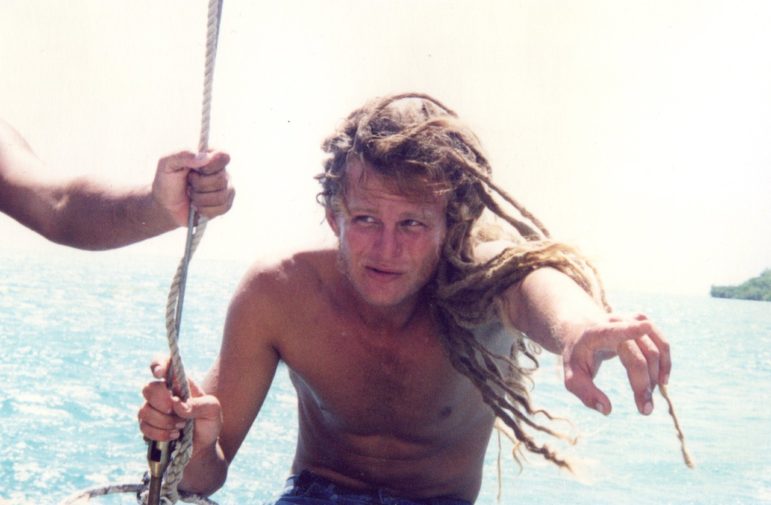The Extraordinary Life and Mysterious Disappearance of Thomas Thor Tangvald
Part 2 – Thomas Thor Tangvald
You can read Part 1 here: https://indepthnh.org/2022/10/19/charles-j-doane-the-boy-who-fell-to-shore/
PORTSMOUTH, NH: For Part 2, we delve into Thomas’s life after his father and sister are killed in a shipwreck. He is taken in by Edward and Clare Allcard as a foster. But Thomas is Peter Tangvald’s son, and after university, he returns to the sea and life aboard wooden boats and begins his relationship with women.

Doane is an author living in Portsmouth.
Thomas Tangvald “had odd, overly large feet with widespread toes.” Would you describe him?
“You’re always barefoot [onboard a boat]. I don’t think he wore shoes on a regular basis. He was probably easily barefoot much more than he ever wore shoes throughout his life.”
Describe the way he looks. Thomas said, “to keep the boring people at bay.”
“Thomas had a trim physique when his foster mother saw him and met him for the first time. Her initial impression was that he was undernourished, which might have been the case. I don’t think he was that tall. Very fit. Raised on a boat, he was (then) living in Andorra in the Pyrenees Mountains. He was into gymnastics when he was with the Allcards in Andorra. He had very short hair when he came to Andorra and, according to Clare Allcard, believes he never cut his hair after he came to them. He had naturally curly blonde hair. Then at some point, maybe it started in university, he let his curly hair clump up and go into dreadlocks. By the time he got back to the Caribbean, they were down to his waist. Clare asked him about that hairstyle once he adapted it, and he said he used it to keep the boring people at bay. It would have been something his father never would have allowed. Peter Tangvald always kept his hair short.”
Jean Buchanan becomes Thomas’s lover. He is 21. She is 43. I like her.
“She’s a remarkable woman. She now suffers from chronic fatigue syndrome. She helped me a lot through email. They were together two and a half years, the whole time he was in Cornwall, England. He met her early on.”
Would you describe their parting? This is such a love story parting. It’s very English. She’s at the top of a hill, and the wind is blowing.
“It’s important to note he’s obsessed to get back to where he started in the Caribbean before he lost his family. It would have probably been very good for Thomas to stay with Jean. He might have had a very different life. We should read this.”
“Thomas is preparing to leave Cornwall after spending two and a half years there getting his tiny 22-foot boat ready to sail across the Atlantic back to Puerto Rico.”
“Once he had his provisions aboard, Thomas waited for the tide to turn. Then he said his goodbyes, cast off his lines, hoisted sail, and headed down the river one last time to open water. For both Thomas and Jean this seemed an extraordinarily tragic moment. He assured her it was the saddest day of his life, and later wrote to the Allcards: “We fit together so well that I’m sure had chronology and situation been different we’d have been mated for good.” After Thomas left the dock Jean jumped in her car and raced to Brea Hill, a 200-foot-high mound on the eastern shore of the Camel overlooking the wide river entrance. Melody passed below outbound with her sails pulling hard, and Jean saw Thomas had scrawled across them “I LOVE YOU” in huge letters. It was, she wrote later that day, “the most beautiful yet the saddest sight I will experience for a long time!” And she added: “My tears could have easily carried Melody across the big pond.”
We have to get into the darker side of Thomas and would like you to talk about his drinking and his drugs. First, he was on crack and cocaine and pot, and then the bouts of sleeping would overtake him.
“The sleeping is interesting. Several people who knew Thomas kind of assumed he suffered from PTSD. He had been orphaned in a terrible wreck. He’d seen his mom and his stepmother killed. He’d been physically abused by his first stepmother. You read the base symptoms for PTSD; falling asleep all the time is not one of them. The normal is to have trouble sleeping and trouble falling asleep, and you awake having nightmares reliving the experience that traumatizes you. Thomas had this sleeping problem. I read a book by Bruce Perry. There was this presumption that there is no such thing as childhood trauma. Children are incredibly resilient. Bruce Perry starting in the late 1980s, started doing research on childhood trauma and published a book called The Boy Who Was Raised as a Dog. I read this book looking for insights into Thomas. They are just case histories, and one was this young girl who would go unconscious as a result of how she had been treated. I said that’s like Thomas.”
With Thomas, it’s different. It’s DTD, Developmental Trauma Disorder.
“Even more than this book is about sailing; it’s a book about childhood trauma and a very unique example of it. One of the symptoms of any traumatic disorder is substance abuse. Thomas’s father was, in terms of his living habits, very ascetic. He didn’t smoke, drink, wouldn’t eat meat, and Thomas was raised this way. He went off to university; he’s into veganism, didn’t smoke, didn’t drink. He was doing gymnastics and is very healthy. He started experimenting with drugs, as many do in college, and tried a lot of stuff fast. This included LSD, which he peddled for a while to help buy his boat, his post-university dream ship, as he called it. He tried some brown heroin, mushrooms, smoking pot, and there’s probably some rave drugs, but he still would not drink alcohol. After he returned to the Caribbean on his own quickly developed a crack cocaine habit. It consumed him for about eight months and then stopped. The one thing he did to manage coming down off cocaine highs was he started drinking rum. For all the strength of willpower, it was the habit he couldn’t control. And he tried.”
We’re onto Stephanie Labonville. Talk about their relationship. Was he faithful to her?
“No, he was not. Jean Buchanan was the first woman he ever had sexual relations with, and Thomas was starting early in his life and wanted to get with the girls. Whenever he got to an anchorage [with his father, Peter] and settled down, he would cruise and look for girls he could make friends with. He always wanted to get with the girls and broke through with Jean. He got adept at seducing women as his father had been. He must have had some sense of how his father did what he did. How many wives did Thomas see, not counting his mother? Ann and Florence.”
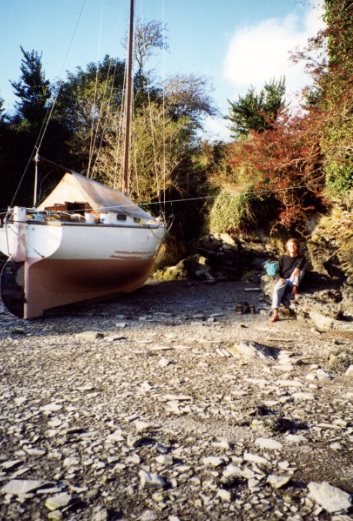
What was their life like on the Melody?
“It had to have been primitive. Stephanie was a tourist on Culebra and had come down from Canada to the Caribbean thinking, maybe I’ll migrate to the Caribbean. [She] met Thomas in Culebra. They developed a bond quickly, and she said great, I’ll be back. I’m going to get my stuff from Canada, and I’ll be back and came back a month later with a pile of luggage and three dogs, two Jack Russell terriers, and a Rottweiler. He had a menagerie of boats at this time. He was living on Melody. Aquila was another one they lived on. These are small living spaces—particularly Melody, a 22-foot boat. For two adult human beings and three dogs, it had to be cramped. Thomas didn’t particularly like dogs.”
But there’s no running water. It’s not like it’s got a stove and a full kitchen.
“There would be running water to the extent the boat had water tanks. There’s a hose to a hand pump, and you can pump some water by hand. No running water in the sense you can turn on a tap, and water comes out.”
This is not luxury. It’s the opposite of it.
“Thomas was initially not faithful to Stephanie. I spent a little time with Stephanie. Stephanie does not take shit from people. She found what was going on and told Thomas she’d kill him if she caught a disease from him. Stephanie was genuinely interested in sailing. She’s the one woman that Thomas went out with who Thomas taught to sail properly. Stephanie went on after she and Thomas broke up and became a bluewater cruiser in her own right. She’s very much under the Tangvald influence. She got an old wooden boat she found in Boqueron, Puerto Rico. They had broken up, and she asked Thomas to look at it. Thomas wholeheartedly approved of the boat. She spent several years cruising that boat in the Caribbean and up to the Eastern United States and back a few times. She lost that boat. This all was happening when I first met Stephanie; she was fuming about her husband had stolen her boat.”
Her then-husband?
“Her soon to be her ex-husband. They were estranged. She was selling the boat, and he stole it because he had grown so fond of it. One of the things I was giving her advice on was she said how do I find this boat. I said I can put you in touch with yacht brokers who visit a lot of different marinas throughout Florida doing yacht brokering. It’s a distinctive boat. If anyone sees it and has been told to look for it, they’ll recognize it. Her husband disappeared on it.”
That’s the end of this story? Is he gone?
“Yea lost at sea on that boat. She’s not entirely convinced he didn’t just disappear himself on purpose. He was reported missing. It would be so easy to get rid of somebody.”
“When I first started ocean sailing, one of the apocryphal tales I heard was this husband and wife had been sailing the Caribbean, and they’re going to lock through the Panama Canal and go across the Pacific on the Coconut Milk Run. Sail down the eastern trades in the Pacific and visit all those fantastic places like Tahiti and French Polynesian. The guys working the canal had noticed that these two were always arguing. They leave Panama and stop at the Galapagos. There’s only one of them on board when they get to the Galapagos. Him. His story is she got sick. She died, her body started rotting, and he threw her overboard. There’s no way to disprove this. All you have is the circumstantial evidence they were seen arguing a lot in Panama.”
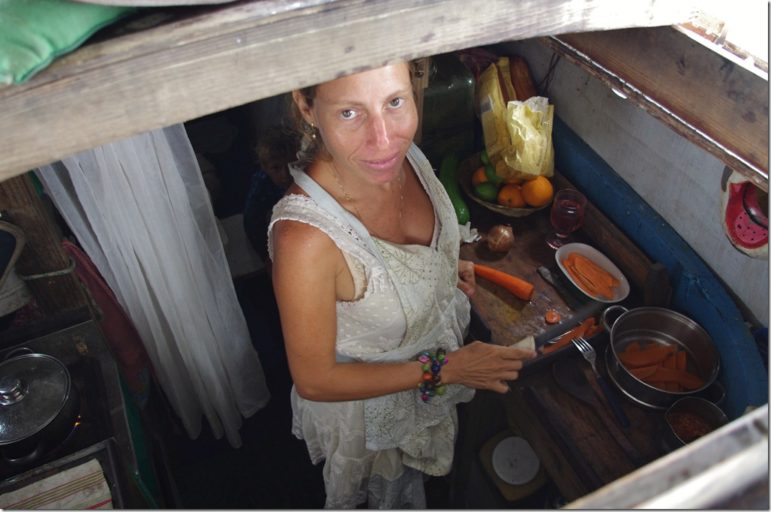
We’re on to Christina Pasquinucci. Thomas says something about too many women on board.
“Thomas first met Christina when she talked her way onto a 17-foot racing boat he had. He took to Jost Van Dyke in a wooden boat regatta there. One of the characters you meet in the book is Philocianno “Foxy” Callwood, who knows a lot of people. Anybody who has spent time in the British Virgin Islands knows about Foxy and his famous beach bar, Foxy’s Bar, in Jost Van Dyke. Foxy is this old islander. He made a living on boats when he was young and ended up with this beach bar. He sings and strums a guitar. They’re racing at Jost in this little 17-foot boat. You see boats like this throughout the Caribbean. Old sailing workboats that have been repurposed as racing boats. He and Stephanie, and Christina were crewing that boat. He stays with Christina, and Stephanie gets out of the way.”
Did you like Christina?
“Yes. She has a very big heart. After I had written up everything and I’m keeping my word that I’ll show you what I’ve written, and she couldn’t read it. She hasn’t been able to read anything because it’s too hard for her.”
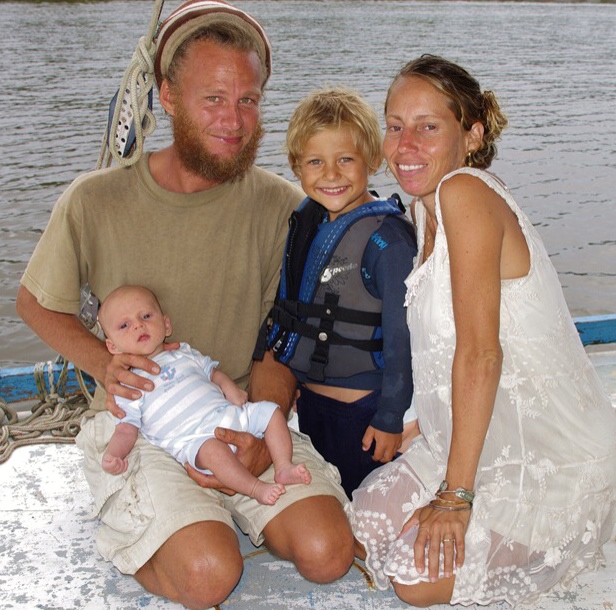
She has two children with Thomas. It’s dreadful what she has to do to keep her children alive and fed while he’s getting the boat ready for them to go to Brazil.
“Christina has a big adventure gland in her. She was raised on the north coast of Puerto Rico, and she was always willing to go off and have adventures with Thomas. You talk to her now, she’s in her forties, she can’t believe what she put her two young boys through.”
I wrote tortuous time for Christina, Lucio, and Gaston – frogs and mites. They’re staying in a hovel.
“They were in a squat. Cayenne, the capital of French Guiana, is part of France and the EU. They get most of their stuff from Europe, so it’s a more expensive place to live. The housing is very expensive. He’s getting a boat ready to go to Brazil. They sailed to Brazil and got kicked out for not having visas, and the nearest place they could retreat to organize their papers was French Guiana. Lucio was born just a few days after they arrived in Brazil. Lucio was the third in his line born on a boat. Thomas’s mother, Lydia, was born on a ferry boat between two islands in New Caledonia. Thomas was born on his dad’s boat in the Indian Ocean. Lucio was born on a boat tied up in a river in Brazil. Christina went home to Puerto Rico with the two boys; they hadn’t organized any paperwork for Lucio. I guess he had a Brazilian birth certificate but didn’t have a US passport yet. He’s entitled to that. Lucio, today, is very proud of the fact that he’s Brazilian.”
“I had been peppering Christina with email questions for a long time. I sailed my boat down to Puerto Rico and kept it in Florida for winter, and Christina came with Gaston, Lucio, and her new partner Luis. She then had a third son by Luis who was an infant and left behind with her mom. I first stayed in this ruined schoolhouse where her mom lives. This is post the big hurricane, Maria. I stayed with them for a while, and then I had Christina, Luis, and the two boys on my boat.”
Christina and Thomas had a fairly long relationship. They have two children. But she’s weary of this life of poverty and decides she doesn’t want to go to Brazil.
“The drinking was the thing for her. What broke up Thomas and Christina was the drinking. She left him in French Guiana for the first time because her mom sent her a ticket and said, bring your new child to see me. Her mother is a force of nature. She’s a beautiful big-hearted woman, but she is overbearing.”
You met her?
“I went sailing in Puerto Rico with Clare Allcard. It was the first time she’d been on a boat in a long time. I had already sailed my boat down to Fajardo, Puerto Rico at a marina in the fall and then went back in the winter. [Clare and I] rented a car and drove west to where Christina’s mother lives. Christina was living with her mother the summer before the hurricane totaled the island. There were a few hurricane refugees living in this schoolhouse. Christina’s mother had run a school and owned a piece of property that had been a school. It was ravaged in the hurricane. Christina didn’t have a home. There were a couple of friends of hers whose houses had been destroyed, and they were all living in this old schoolhouse. One of the classrooms she made as a bedroom for Clare Allcard and me. Then she put out all this food and all these decorations, made a huge production of our visit. It was very heartwarming.”
We get to the point where Thomas hid Christina’s passport from her so she couldn’t leave him.
“She went away to see her family in Puerto Rico and was away for a few months, came back, and she immediately finds out the living quarters have turned into this squat. They live in a couple of squats. They live in a tent because the boat is uninhabitable anymore. Thomas is drinking. She started making noises about leaving, and that’s the point he hid the passports. He missed when she was away the first time. Finally, she hits a breaking point again. Thomas had taken Gaston to the boatyard and came back two hours late for dinner with Gaston on the handlebars [of his bicycle].”
“Thomas needed women who would be willing to mother him. That was something Jean Buchanan was willing to do. Stephanie was not willing to do that. Christina was very willing. When we were sailing on my boat, she took over the galley. She said this is my safe place.
Christina leaves him, but he needs to go to Brazil and become one with the land.
“Thomas went from this kid who was raised on a boat to understand that most people didn’t live on boats. He was taken aback when he found out that a lot more people were living further inland. Once he got to university and started getting a formal education, he got internet access, which fired up Thomas. He analyzed human society pretty quickly and accurately. He understood early on climate change was going to be a problem. That was the 1990s.”
“He had decided that Puerto Rico wouldn’t be a stable place going forward. This is right around the time of the great recession. The global economy collapsed for a while. Puerto Rico was hard hit, being tourism is a lot of what their economy is about. He saw it in terms of food. Most of Puerto Rico’s food was imported [from the US]. So many people in Brazil are self-sufficient. He saw Brazil as this place that had a left-leaning government which was encouraging squatters to take public land and unused private land.”
He was determined to go there. But he has this boat that is not capable of traversing the distance.
“Thomas’s nautical prejudices were entirely influenced by his upbringing. He favored wood boats. When he was a boy living on Puerto Rico and interested in boats and boat design, he fell in love with nativo’s. Thomas had a friend who had done the same thing to a nativo, turned it into a little cruising boat. He put a house on it, made some simple interior accommodations, and lived on it. It had no engine on it. Thomas just did the same thing.”
Would you explain what happened on March 4? Christina has left him.
“He sailed away. Christina had left him, and he was determined to go to Brazil. He had told Christina he had stopped drinking. It seems he hadn’t, or he had started again. The boat could not have been ready to go. The boat was capable, and he was capable of getting the boat from Puerto Rico to Brazil and then to French Guiana. The boat’s ballast was stolen when he was in French Guiana, and this is all the lead pigs you put in the bottom of the boat to keep it upright when the wind is pressing against the sails. This is just dead weight. A mono-hull sailboat is like a punching clown. You put all the weight at the bottom, and it [the boat] gets knocked down and stands back up again. That’s the basic principle. Someone stole all the weight from the bottom of his punching clown, and his problem is, how do I replace that weight? Lead is quite expensive and wasn’t easily available in French Guiana. So he went around the city looking for old air conditioners people had thrown out. He’d strip the copper plumbing out of those air conditioners to use as ballast.”
Not the actual air conditioner, just the copper plumbing?
“Yes, because that’s the densest metal in an air conditioner. Copper is a fairly dense metal. Lead is commonly used because it is very dense. Some people use iron. He was thinking of using old engines. He was not able to replace all the weight. So the boat was under ballasted when he left. He had a problem with leaks too. After the ballast was stolen, the boat was lying on its side because it couldn’t sit upright anymore, and the tropical sun got really hot and shrank up a lot of the wood. She was leaking, and leaks are controllable.”
He knows this, but he goes anyway.
“He knew the boat wasn’t ready. But he said in a Clare Allcard letter; I’d rather take my chance with nature than with humans. He sailed off on March 4.[2014] Christina led me to an old friend of Thomas’s, Elmer Van Pelt, known as Elm. He assured me that no way is Thomas gone. He’s king of a lost tribe up a river somewhere. I’m sure of it. Christina’s initial reaction is he’s ghosting me. She couldn’t be convinced that he wasn’t. The whole time I’ve known her, she’s gone back and forth on whether or not she thinks he’s dead or not. I told someone I could publish this book, and Thomas could suddenly appear and say, hey, what are you doing writing a book about me? I’m not expecting him. I think he was lost at sea. It’s a very tragic story.”
Final question. The Boy Who Fell to Shore, where did you get the title and explain it to me?
I hope readers recall the film starring David Bowie, The Man Who Fell to Earth. I remember that film, and the story is that this is alien is shipwrecked on Earth and needs to put together the resources to get off Earth. Oddly enough develops a drinking problem. The original story, which is based on the book The Man Who Fell to Earth, was by Walter Tevis. This title describes Thomas pretty well. He’s like this alien, this otherly person raised at sea who has to now exist on shore. Christina told me when I sent her a picture of the cover, and she said it made me cry. The boat [on the cover] is the Melody, the boat that Thomas sailed across the Atlantic from Cornwall to Puerto Rico, forty-seven days, non-stop.”
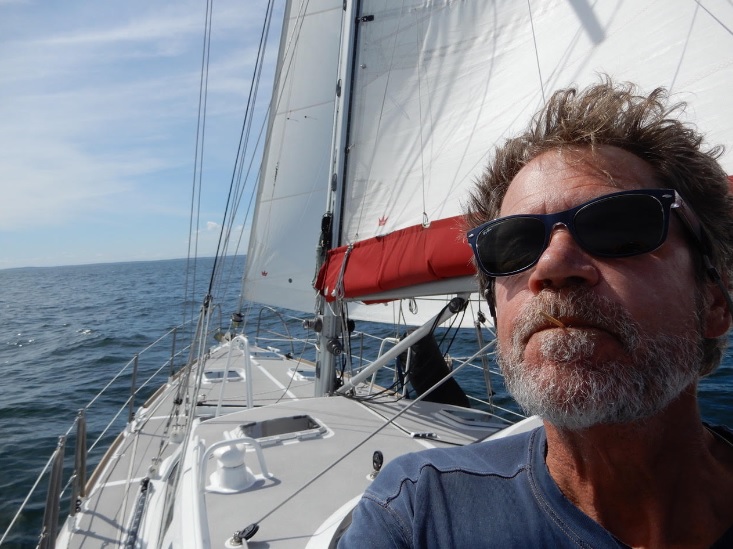
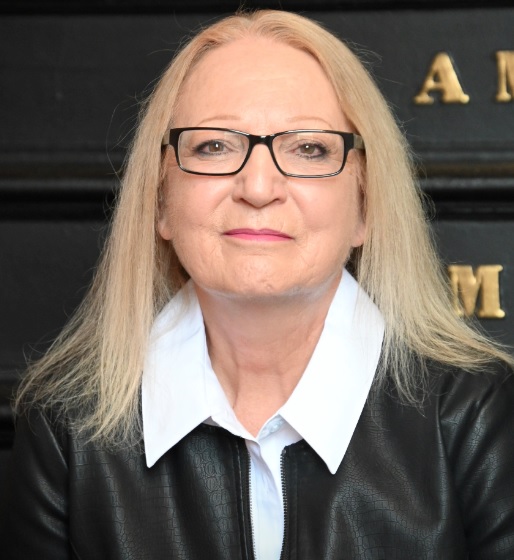
Beverly Stoddart is a writer, author, and speaker. After 42 years of working at newspapers, she retired to write books and a blog. She is on the Board of Trustees of the New Hampshire Writers’ Project and is a member of the Winning Speakers Toastmasters group in Windham and the Ohio Writers’ Association. Her latest book is Stories from the Rolodex, mini-memoirs of journalists from the 1960s, 1970s, and 1980s. A prized accomplishment was winning Carl Kassel’s voice for her voice mail when she won the National Public Radio game, Wait Wait…Don’t Tell Me! She has been married for 45 years to her husband, Michael, and has one son and two rescue dogs.
